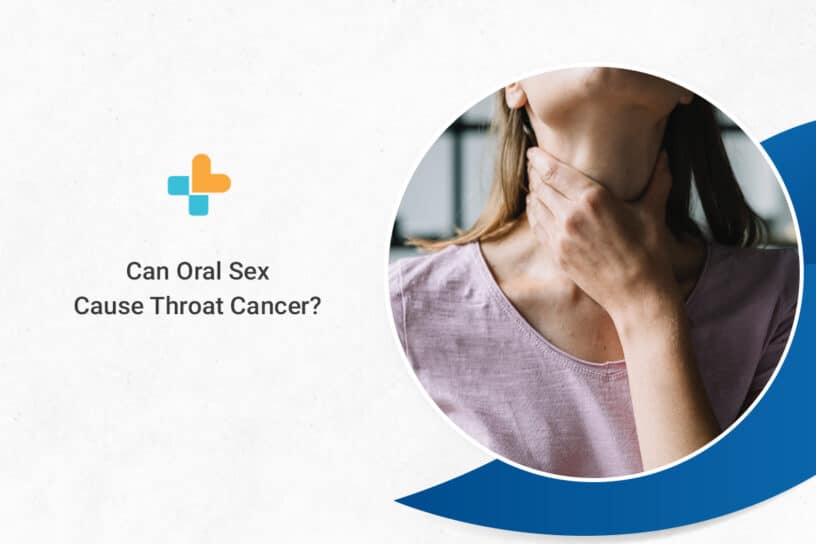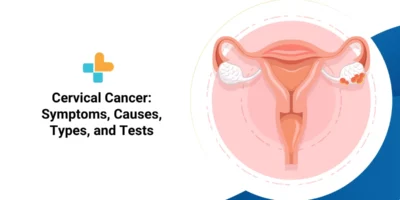The human papillomavirus (HPV) is a common sexually transmitted disease that increases chances of developing throat cancer. Given the prevalence of many HPV cases in India, one of the most common questions we get from couples is: can oral sex cause throat cancer?
In this article, we dive into the scientific research and statistics to reveal whether oral sex increases your chances of developing throat cancer.
We’ll also look at ways to prevent throat cancer, what HPV symptoms to watch out for, and some common risk factors for throat cancer.

Can Oral Sex Cause Throat Cancer?
Yes, oral sex can cause throat cancer. While oral sex could be safer than vaginal or anal sex, it may still carry some risks when performed without taking precautions.
Like vaginal and anal sex, oral sex can transmit sexually transmitted infections (STIs) such as gonorrhoea, syphilis, herpes, and human papillomavirus (HPV). While the risk is lower than with other forms of sex, it still exists.
Research shows that people who engage in oral sex could have an 80% higher risk of developing oral cancer and throat cancer than does who don’t.
Barrier methods, like dental dams or condoms, can further reduce risk. Also, regular testing and open communication about STI status with partners is vital for safe sex.
Prevention
To prevent throat cancer — potentially caused by the human papillomavirus (HPV) transmitted through oral sex — consider these steps:
- HPV vaccination: This vaccine is highly recommended for boys and girls in their early teens, and it can be given up to age 26.
- Safe sex: Barrier methods like dental dams or condoms during oral sex can reduce the risk of throat cancer.
- Regular screenings: Regular dental or medical check-ups can help detect any abnormal changes early.
- Limit the number of sexual partners: The risk of STIs and conditions related to them increases with the number of partners.
- Avoid tobacco and alcohol: Both are major risk factors for throat cancer.
What Symptoms Should You Watch For?
HPV often doesn’t show noticeable symptoms and tends to go away on its own. However, certain types of HPV can cause warts or lead to cancer.
For the types of HPVs that cause warts, symptoms may include:
- Genital warts: Small, flat, or raised bumps, typically appearing on the genitals, anus, mouth, or throat.
- Common warts: Rough, raised bumps, usually on the hands, fingers, or elbows.
- Plantar warts: Hard, grainy growths on the heels or balls of feet.
For cancer-causing HPVs, you may not see any symptoms until the cancer is advanced. Regular screenings like Pap tests for cervical cancer can help detect these HPV types.
Note: Not all people with HPV will develop warts or cancer. Consult a healthcare professional if you’re concerned about any symptoms.
Types of HPV
There are over 100 kinds of HPV. They’re categorized based on their risk for causing cancer:
- High-risk HPVs: These can cause cancer, including cervical, anal, oral, penile, vulvar, and vaginal cancer. The most notable ones are:
- HPV 16 and 18: These two types are responsible for most HPV-caused cancers.
- Low-risk HPVs: These generally do not cause cancer but can cause skin warts. Notable ones include:
- HPV 6 and 11: These types are primarily responsible for genital warts.
- Other types: These include a variety of HPV types that usually cause common skin warts. They include HPV types 1, 2, 3, 4, 27, 29, and 57, among others.
Some forms of HPV are more dangerous than others. Vaccination can protect you from the most common dangerous types.
Risk Factors for Throat Cancer
Several risk factors can increase your likelihood of developing throat cancer:
- Tobacco use: This is the most significant risk factor. Tobacco use includes cigarettes, cigars, pipes, chewing tobacco, and snuff.
- Alcohol consumption: Heavy drinking, especially beverages with very high alcohol content, can increase throat cancer risk.
- Human papillomavirus (HPV): Certain types of HPV, a sexually transmitted infection, can cause throat cancer.
- Gender: Men are more likely than women to get throat cancer.
- Age: The risk of throat cancer increases with age, with most cases occurring in people over 65.
- Gastroesophageal reflux disease (GERD): This condition can increase the risk of certain types of throat cancer.
- Asbestos exposure: Work-related exposure to asbestos can lead to certain types of throat cancer.
- Exposure to certain chemicals: Certain industries such as metalworking, petroleum, and textile may expose you to chemicals that can increase the risk of throat cancer.
- A history of certain head and neck cancers: If you’ve had certain types of head and neck cancers, you might have an increased risk of throat cancer.
Remember, having these risk factors does not guarantee that you’ll develop throat cancer, but they do increase the likelihood. Reducing these risk factors can lower your chances.
Learn More About Safe Oral Sex: Book an Appointment
Practising safe sex is one of the best ways to avoid STIs and STI-related diseases like throat cancer. The key to understanding safe sex is open communication with your partner, along with the guidance of a good doctor.
We invite you to consider Ayu Health Network of Hospitals for your next check-up or if you’d like to learn more about practising safe sex.
With a 4.7 Google rating, Ayu Health is one of the most trusted network of hospitals in India. Visit our website today to learn more.
Our Hospital Locations
Oncology Surgery Hospitals in Bangalore | Oncology Surgery Hospitals in Jaipur | Oncology Surgery Hospitals in NCR | Oncology Surgery Hospitals in Hyderabad
Our Doctors
Oncology Surgery Doctors in Bangalore | Oncology Surgery Doctors in Jaipur | Oncology Surgery Doctors in NCR | Oncology Surgery Doctors in Hyderabad




